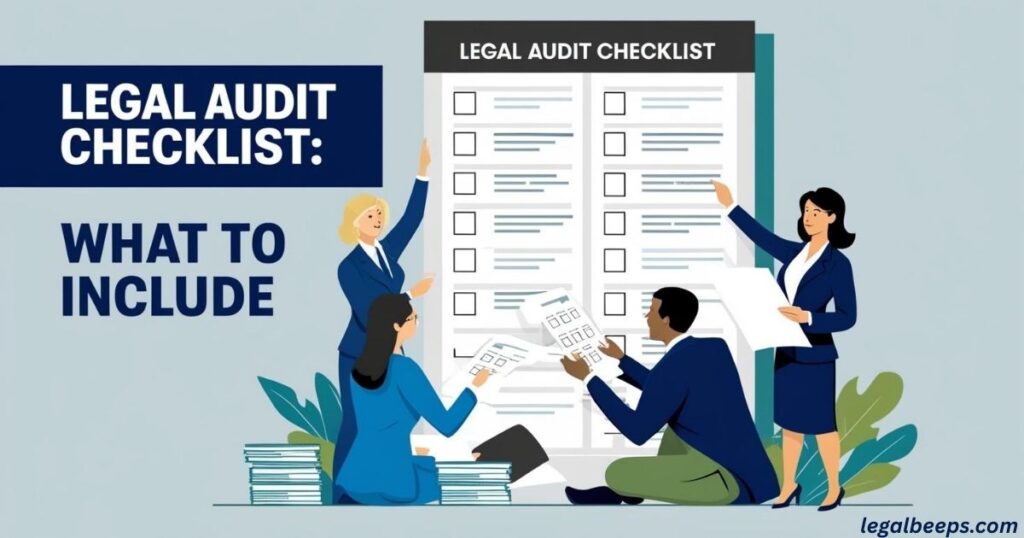A Legal Audit is more than just a review,it’s a game changer for your business. It dives deep into everything from contracts to compliance with the latest laws. The purpose? To uncover hidden risks and gaps in your legal processes before they become costly problems.During a Audit, experts thoroughly examine your contracts, business documents, and compliance records. They identify potential issues and offer solutions to resolve them.
By catching legal problems early, an Audit protects your business from future disputes and financial penalties. It’s a crucial step in managing legal risks and keeping your business in top shape. Regularly conducting a Legal Audit ensures you’re always up to date with laws and regulations, ultimately securing your company’s future and boosting investor confidence. Don’t wait for issues to arise,take control with an Audit today.
What Is a Legal Audit? (Legal Audit Meaning)
An Audit is a comprehensive examination of a company’s legal standing across various aspects of its operations. It assesses how well the organization complies with current laws, regulations, and contractual obligations. This includes scrutinizing areas like labour compliance, intellectual property documentation, company law compliance, and environmental standards.
Unlike a financial audit, which zeroes in on monetary records, An Audit dives into legal risk management, contract verification, and statutory compliance. It acts as a legal health check,highlighting gaps in documentation, governance, or regulatory compliance before they turn into serious legal liabilities.
Legal Audit Checklist: What to Include

A well-rounded Audit checklist should cover all critical compliance and documentation areas that impact your business. Key elements to include are:
- Ensuring compliance with corporate law and statutory obligations.
- Verification of employment agreements and HR policies.
- Validation of business licenses, factory license, and environmental compliance reports.
- Review of ROC filings, statutory registers, and board meeting minutes.
- Evaluation of intellectual property protection, including trademark and patent registrations.
- Contract review for vendors, clients, and lease agreements.
- Assessment of tax compliance audit status and financial documentation.
- Analysis of company’s documentation for audits and legal due diligence.
- Checking for gaps in regulatory compliance.
- Identifying risks and gaps in the company’s legal processes.
Using a structured checklist minimizes the risk of non-compliance. Businesses, especially SMEs in areas like Sector 63 Noida or Delhi-NCR, can benefit from expert-led compliance audit services tailored to their industry and regulatory landscape.
Audit Preparation Steps: Setting the Foundation
Laying the groundwork for a successful Audit involves strategic planning and proper documentation. Before diving into the audit, businesses should take the following preparatory steps:
- Organize all business compliance documents, including Memorandum of Association and Articles of Association.
- Gather employment contracts, NDAs, and termination clauses for internal legal review.
- Compile key compliance records like ESI/PF filings, tax returns, and environmental reports.
- Conduct a gap analysis to identify missing or outdated regulatory filings.
- Ensure version-controlled systems are in place for tracking legal documentation.
- Coordinate with HR, finance, and operations departments for audit readiness.
- Consult a business legal advisor in Noida or similar professionals for audit checklist alignment.
- Review all vendor, client, and lease agreements for legal compliance.
- Assess intellectual property documentation for patents, trademarks, and copyrights.
- Prepare financial documentation for tax compliance and audit assessments.
These audit preparation steps form the backbone of risk mitigation and ensure your organization stays ahead of potential legal liabilities.
Documentation for Legal Audits: What You Need

A thorough Audit requires businesses to gather key documents that demonstrate compliance and risk management. The most important items to include are:
- Corporate documents like the Memorandum of Association and Articles of Association.
- Employment agreements, including HR policies and labor compliance documents.
- Contracts with clients, vendors, and service providers, particularly those related to contract verification.
- Intellectual property documentation such as trademark registrations and copyright filings.
- Business licenses, factory license, and environmental compliance reports.
- Statutory records, including ROC filings and board meeting minutes.
- Tax filings and financial statements for audit review.
- Vendor and client contracts, with an emphasis on renewal and termination clauses.
- Regulatory compliance documents related to industry-specific requirements.
- Documentation for intellectual property rights like patents and trade secrets.
Legal Risk Management: Identifying Red Flags
Effective Legal Risk Management involves identifying potential red flags that could lead to future legal disputes or non-compliance issues. Here are the key areas to focus on:
- Reviewing contracts for termination clauses, liability limits, and renewal terms.
- Ensuring compliance with corporate law and labor compliance to avoid employment-related issues.
- Conducting a legal due diligence process to identify gaps in intellectual property protection.
- Assessing business compliance documents like tax compliance audits and statutory registers.
- Monitoring ongoing legal obligations, such as environmental compliance and intellectual property documentation.
- Evaluating risk mitigation strategies to prevent violations of company law compliance.
- Verifying business licenses and permits to maintain regulatory compliance.
- Reviewing vendor, client, and service provider contracts to ensure legal clarity.
- Ensuring timely and accurate filings of ROC documents and board meeting minutes.
- Reviewing and updating HR policies to stay aligned with labor law changes.
By identifying these red flags early on, businesses can prevent costly legal liabilities. For companies in Noida or Delhi-NCR, it’s crucial to work with a trusted legal advisor to implement a proactive risk management strategy that addresses these potential issues.
Corporate Legal Health Check: Stay Audit-Ready Always
View an Audit as an ongoing process rather than a one-off event in your corporate legal health strategy. Plan for regular internal reviews every six months, keep compliance documents updated, and stay informed about legal changes from regulators and ministries.
For SMEs, it’s particularly important to collaborate with SME compliance consultants in Noida to ensure a consistent legal maintenance routine that supports long-term growth and scalability.
Legal Audit vs Financial Audit: Know the Difference
Many business owners often confuse an Audit with a Financial Audit. Here’s a straightforward table to help differentiate the two:
| Audit Type | Focus Area | Outcome |
| Legal Audit | Legal compliance, contracts, intellectual property | Identifying legal risks, ensuring compliance |
| Financial Audit | Financial records, accounting transactions | Assessing financial stability, detecting fraud |
While both are crucial, the Audit ensures your business complies with laws and regulations, whereas the Financial Audit evaluates the accuracy and health of your financial practices.
Legal Audit for Delhi-NCR Businesses: A Local Approach
If your business is located in Delhi-NCR, it’s highly recommended to work with professionals familiar with the regional legal landscape and industry-specific details. Renowned compliance audit firms in Noida, such as Vera Causa Legal, offer extensive expertise in:
- Local business law and audit requirements in Noida.
- Industry-specific company law compliance for various sectors.
- Due diligence processes tailored for startups.
- Compliance with local tax regulations and zoning laws.
- Assisting with company registration and meeting audit requirements for new businesses.
- Supporting businesses in aligning with regional labor law requirements.
- Ensuring compliance with environmental regulations in Noida.
- Guiding startups through the process of legal structuring and compliance.
- Verifying adherence to intellectual property laws and trademark registrations.
- Assisting with ongoing regulatory compliance and audit readiness for businesses.
Partnering with the right legal team ensures your business stays compliant and prepared for any regulatory challenges.
Protecting Your Intellectual Property and Contracts
A key component of any Audit is confirming the authenticity of your intellectual property documentation. Have you registered all necessary trademarks? Are your patents up to date? Are there any potential disputes or conflicting claims?
At the same time, it’s important to review all agreements with vendors, clients, and employees. Check termination clauses, NDAs, liability limits, and renewal terms to ensure they align with the latest legal requirements. This proactive approach helps mitigate the risk of future legal issues.
Employee Contracts and Labour Compliance
Failure to comply with employment laws is a frequent cause of legal disputes. As part of a Audit, it’s essential to ensure that all HR-related documents , including offer letters, employment contracts, and PF/ESI filings , adhere to local labour standards. The process of employee contract verification is especially important for businesses with large or geographically diverse teams.
Additionally, review your HR policies to confirm they are up to date with the latest labour codes and anti-harassment mandates. Keeping these documents current helps prevent legal risks and ensures compliance with evolving regulations.
Legal Audit: A Must-Have for Startups and SMEs
Startups often overlook the importance of proper legal structuring while striving to grow quickly. An Audit provides valuable peace of mind and legal clarity. It enables founders to:
- Ensure compliance with essential business documentation requirements.
- Correct any early-stage regulatory gaps in India.
- Prepare for upcoming funding rounds through a detailed due diligence process.
- Mitigate potential legal risks before they escalate.
- Align business operations with corporate law and statutory obligations.
- Address contract verification issues with vendors, clients, and partners.
- Safeguard intellectual property through updated protection documentation.
- Maintain compliance with tax regulations and statutory filings.
- Review employment agreements for legal clarity and compliance.
- Ensure your business has proper environmental and labor law compliance in place.
For early-stage companies in Noida, partnering with a skilled corporate lawyer offers ongoing support in both growth and regulatory compliance.
Read Also: Latest Visa Rejection Reasons & How Legal Experts Can Help
Preparing for a Business Audit: Tips from Legal Experts
Here are a few practical tips to keep in mind when preparing for a business audit:
- Designate a single point of contact (POC) to manage the audit process
- Involve top management to ensure they stay informed and engaged
- Digitize compliance records for quick and easy access
- Be open about any past notices or ongoing legal disputes
- Bring in audit support services early to streamline the process
With a reliable partner like Vera Causa Legal, businesses receive step-by-step guidance and support throughout the entire audit journey.
Case Study: Legal Audit Success in Noida

A mid-sized manufacturing company based in Sector 63, Noida, reached out to us for an Audit after receiving several notices from the labour department. Our audit uncovered:
- Missing statutory registers
- Expired factory license
- Unregistered trademark for a key product line
- Outdated HR policy manual
By following our comprehensive audit checklist, the company achieved full compliance within three months, avoiding potential penalties and boosting investor confidence.
FAQ’s
How can a Legal Audit help startups?
An Audit ensures startups meet compliance requirements, avoid mistakes, and prepare for growth, funding, and legal structuring with all documents in order.
How does a Legal Audit impact business growth?
An Audit helps businesses resolve legal issues, maintain compliance, reduce lawsuit risks, and build investor confidence, key to fostering sustainable growth.
Can a Legal Audit help with tax compliance?
Yes, An Audit ensures your business meets tax compliance by reviewing tax filings, licenses, and documentation, keeping everything current and in line with regulations.
What legal areas are covered in a Legal Audit?
An Audit covers corporate law, employment law, intellectual property, contract law, and regulatory compliance to ensure your business’s legal health is fully in check.
What does a Legal Audit include?
An Audit reviews contracts, employee agreements, intellectual property, and compliance records. It checks for any gaps or risks in your legal processes.
Conclusion
A Legal Audit is essential for every business, ensuring it stays compliant with the law and avoids costly legal troubles. Regular Audits help identify risks early, preventing disputes, fines, and damage to your reputation.This audit checks all key areas of your business, from contracts and intellectual property to employee agreements and tax compliance. It provides peace of mind, knowing your business is legally sound.
By addressing legal issues proactively, you can prevent potential problems that could hinder your growth.With an Audit, businesses can manage legal risks more effectively and ensure they are always up to date with the latest laws. It’s a crucial step in protecting your company’s future. Don’t wait for issues to arise,schedule a Legal Audit today to safeguard your business and support its long-term success.

